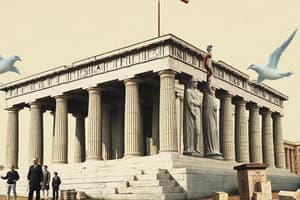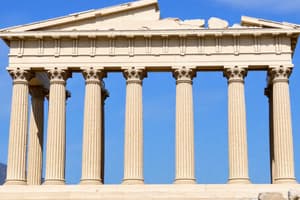Podcast
Questions and Answers
Aristotle believed that women were as naturally smart as men.
Aristotle believed that women were as naturally smart as men.
False (B)
What are the pros of a monarchy?
What are the pros of a monarchy?
- Qualified Person
- More efficient decision making
- Older/Wiser/Mature
- All of the above (correct)
What are the pros of oligarchy (small group of elite people)?
What are the pros of oligarchy (small group of elite people)?
- They have the highest amount of wise and smart
- Able to inspire others to try to be elite
- Can't relate better to the common people
- All of the above (correct)
What are the cons of oligarchy?
What are the cons of oligarchy?
What are the pros of all (direct) democracy?
What are the pros of all (direct) democracy?
What does 'Demos' translate to?
What does 'Demos' translate to?
What does 'Kratia' translate to?
What does 'Kratia' translate to?
What does 'AcroPolis' translate to?
What does 'AcroPolis' translate to?
In the military, not everyone had to serve.
In the military, not everyone had to serve.
What were members in Sparta called?
What were members in Sparta called?
What is a 'Cuirass'?
What is a 'Cuirass'?
What are 'Greaves?
What are 'Greaves?
What is a 'Hoplon'?
What is a 'Hoplon'?
What choices did Athens (Greeks) have when Persia launched a 2 prong (land and naval) attack?
What choices did Athens (Greeks) have when Persia launched a 2 prong (land and naval) attack?
Match the Greek Warrior attributes to the corresponding warrior
Match the Greek Warrior attributes to the corresponding warrior
Match the Headpiece to it's corresponding warrior
Match the Headpiece to it's corresponding warrior
Match the shield to it's corresponding warrior
Match the shield to it's corresponding warrior
Match the trait to it's corresponding warrior
Match the trait to it's corresponding warrior
What does voting change about the motivation of Athens?
What does voting change about the motivation of Athens?
Each person voting = Direct Democracy.
Each person voting = Direct Democracy.
America has direct voting.
America has direct voting.
The Greeks winning fuels what?
The Greeks winning fuels what?
What problem did Pericles want to solve to strengthen democracy?
What problem did Pericles want to solve to strengthen democracy?
Pericles dealt with making The Political Positions in Athens were not paid jobs, meaning that only the really rich were able to have much power, by increasing the number of ______.
Pericles dealt with making The Political Positions in Athens were not paid jobs, meaning that only the really rich were able to have much power, by increasing the number of ______.
Match the following democracy attributes to the corresponding democracy
Match the following democracy attributes to the corresponding democracy
The following is the last line in Pericles's Speech: 'We will keep anyone from being active in democracy'.
The following is the last line in Pericles's Speech: 'We will keep anyone from being active in democracy'.
Women, children, slaves are able to vote.
Women, children, slaves are able to vote.
Democracy was in the hands of ALL the people.
Democracy was in the hands of ALL the people.
What was the worst internal conflict in Ancient Greece?
What was the worst internal conflict in Ancient Greece?
During the war between Athen and Sparta, why did Athenians abandoned the country side?
During the war between Athen and Sparta, why did Athenians abandoned the country side?
During the war between Athen and Sparta, were painters well off in Athens?
During the war between Athen and Sparta, were painters well off in Athens?
What is Ekklesia?
What is Ekklesia?
What is Agora?
What is Agora?
How do Athens achieve Glory?
How do Athens achieve Glory?
If Persians ever attack again, they (Athens, Agean islands..ect.) need a what?
If Persians ever attack again, they (Athens, Agean islands..ect.) need a what?
What is the 1st type of column?
What is the 1st type of column?
What type of column has scrolls on the side?
What type of column has scrolls on the side?
What type of column is the most detailed?
What type of column is the most detailed?
During the Archaic Period, what are the Sculpture traits?
During the Archaic Period, what are the Sculpture traits?
Everything was done to honored the what?
Everything was done to honored the what?
Flashcards
Direct Democracy
Direct Democracy
A system where citizens vote directly on laws and policies.
Oligarchy
Oligarchy
A political system controlled by a small elite group of individuals.
Polis
Polis
A city-state in ancient Greece, a fundamental political unit.
Acropolis
Acropolis
Signup and view all the flashcards
Hoplite
Hoplite
Signup and view all the flashcards
Phalanx
Phalanx
Signup and view all the flashcards
Pericles
Pericles
Signup and view all the flashcards
Theater of Epidaurus
Theater of Epidaurus
Signup and view all the flashcards
Socratic Method
Socratic Method
Signup and view all the flashcards
Allegory of the Cave
Allegory of the Cave
Signup and view all the flashcards
Utilitarianism
Utilitarianism
Signup and view all the flashcards
Tragedy
Tragedy
Signup and view all the flashcards
Comedy
Comedy
Signup and view all the flashcards
Sophists
Sophists
Signup and view all the flashcards
Hubris
Hubris
Signup and view all the flashcards
Delian League
Delian League
Signup and view all the flashcards
Cuirass
Cuirass
Signup and view all the flashcards
Agora
Agora
Signup and view all the flashcards
Aristotle
Aristotle
Signup and view all the flashcards
The Golden Mean
The Golden Mean
Signup and view all the flashcards
Ekklesia
Ekklesia
Signup and view all the flashcards
Philosophy
Philosophy
Signup and view all the flashcards
Hubris
Hubris
Signup and view all the flashcards
Catharsis
Catharsis
Signup and view all the flashcards
Demos
Demos
Signup and view all the flashcards
Kratia
Kratia
Signup and view all the flashcards
The Golden Age of Greece
The Golden Age of Greece
Signup and view all the flashcards
Moral Dilemmas
Moral Dilemmas
Signup and view all the flashcards
Psychology and Ethics
Psychology and Ethics
Signup and view all the flashcards
Fate of Socrates
Fate of Socrates
Signup and view all the flashcards
Study Notes
Golden Age of Greece Study Guide
- Aristotle believed women were not as naturally intelligent as men. The ideal family in the 1950s confined women to the home; in 2024, women work and often manage family responsibilities, often due to economic factors.
Monarchy
- Pros: Qualified leader, efficient decision-making, mature judgment, and wisdom.
- Cons: Single person holds all power, potential difficulty relating to the problems of others, potential lack of understanding of concerns among citizens.
Oligarchy
- Pros: High wisdom and intelligence, inspiration to others to become leaders, and better understanding of common people.
- Cons: Elite may not represent the concerns of everyone, being book smart does not equal street smarts, and difficulty relating to the concerns of commoners.
Democracy
-
Pros: Most inclusive form of government, encourages community building and responsibility, allows for ownership and accountability.
-
Cons: Potential for chaos, decision-making processes may take a long time, and decisions may be based on popularity rather than merit.
-
The growth of Greek city-states led to the development of different political systems, culminating in democracy.
Demos/Kratia/Polis
- Demos: Common people
- Kratia: Power/authority
- Polis: City state
Military
- All citizens were expected to serve in the military.
- Hoplites were foot soldiers in Sparta.
- Cuirass: A chest protector plate
- Greaves: Shin guards
- Hoplon: Wooden and bronze shield Helmets were used to prevent head injuries
Greek vs. Persian
- Persia attempted a two-pronged attack (land and sea) on Greece.
- Athens chose resistance and formed a democracy for the first time.
- The choice for Athens did not involve a leader giving orders but a vote.
Greek Hoplites vs. Persian Warriors
- Greek Hoplites: Had more armor.
- Persian Warriors: Had no armor.
Athenian Democracy
- Only males with citizen fathers could vote.
- Leadership was chosen by lottery.
- Executive branch consisted of 500 men.
- Juries varied in size.
U.S. Democracy
- Male or female citizens born in the U.S. or who have undergone the citizenship process can vote.
- Elected officials hold leadership positions.
- Leaders are chosen by voting.
- Government is made up of a president, vice-president, and a cabinet
- Juries typically consist of 12 people.
Pericles's Goals
- Strengthen democracy.
- Make Athenian democracy more inclusive, so that even the poorest could have a voice in government.
Pericles's Speech
- Analogy: "Trees may look different, but their function is the same."
- Eulogy for fallen Athenian soldiers in the battle against the Persians.
A Day in the Life of an Ancient Athenian
- Athenians lived in a politically and militarily complex time.
- Many Athenians viewed their daughter as liabilities because of the need for large dowries.
- Artists and public life were well-respected and had a high social standing in Athens.
- Women often consulted their husbands.
Pericles's Funding
- Delian League was established as a defense fund following Persian defeat.
Athenian Architecture
- Three main columns (Doric, lonic, Corinthian) were used in buildings/temples.
Phidias and the Parthenon
- Phidias was accused of embezzlement related to the construction of the Parthenon.
- Pheidas proved his funding for the project.
Greek Theatre
- The theatre was built to honor Dionysus.
- Had 14,000 seats and great acoustics.
Music in Ancient Greece
- Music was used for therapy to calm distressed people.
- The healing temples across the Empire drew large numbers of people seeking to be healed by the god of healing.
- Payment for use of the temples and facilities was used to sustain the facilities and keep the place running.
Moral Dilemmas
- Heinz Dilemma: A man steals medicine to save his wife's life. Ethical dilemmas like these exist for complex reasoning.
- Trolley Dilemma: A trolley car is out of control, and you can switch tracks, sacrificing one to save five. Ethical dilemmas like this one exist for complex reasoning.
Socrates and the Fall of Athens:
- Socrates was convicted and sentenced to death
- Was executed by hemlock.
- Critically important moral philosopher.
Allegory of the Cave
- Prisoners in a cave only see shadows and believe them to be reality.
- A prisoner escapes and sees the true world.
- Returns to the cave to share his newfound knowledge, but the other prisoners reject it.
The Socratic Method
- A question-and-answer format to explore and determine the validity of ideas.
- Enables deeper understanding.
Studying That Suits You
Use AI to generate personalized quizzes and flashcards to suit your learning preferences.




